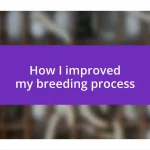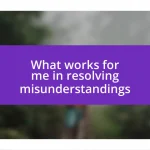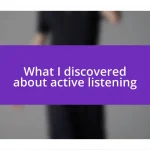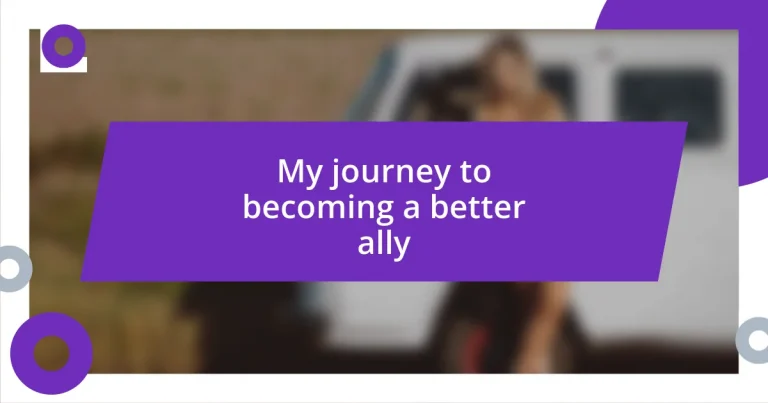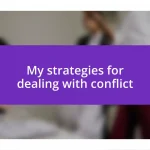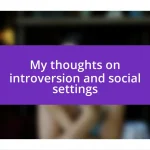Key takeaways:
- True allyship involves commitment and active participation, going beyond mere support to amplify marginalized voices and learn from their experiences.
- Recognizing and reflecting on personal privilege is essential for effective allyship, allowing for greater empathy and awareness in advocating for systemic change.
- Engaging in continuous education and building authentic community relationships fosters deeper understanding and collective action towards social justice.
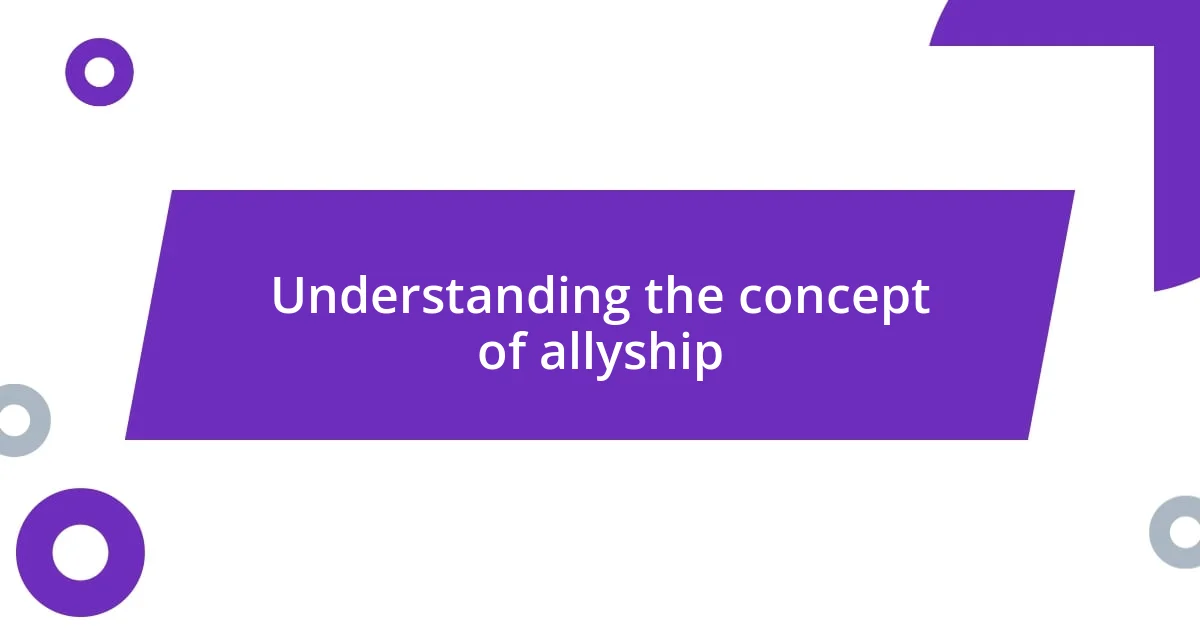
Understanding the concept of allyship
When I first heard the term “allyship,” I thought it simply meant supporting a cause. However, I soon realized it involves much more than lip service; it’s about commitment and action. Have you ever found yourself in a situation where standing up for someone else felt daunting? I have, and those moments taught me the true essence of being an ally.
As I navigated through my journey, I learned that allyship is an evolving practice. It’s not just about recognizing privilege; it’s about using that privilege to amplify the voices of marginalized communities. I remember attending a community meeting where a person of color shared their struggles faced in their daily life. Listening and actively participating in following discussions really opened my eyes to my own blind spots.
One key aspect of allyship is humility. Being open to feedback and willing to make mistakes is crucial. For instance, I once made an unintentionally offensive comment during a group discussion. It stung to hear the correction, but it was a pivotal moment for me. It made me realize that true allyship requires vulnerability and a willingness to learn from those you aim to support.
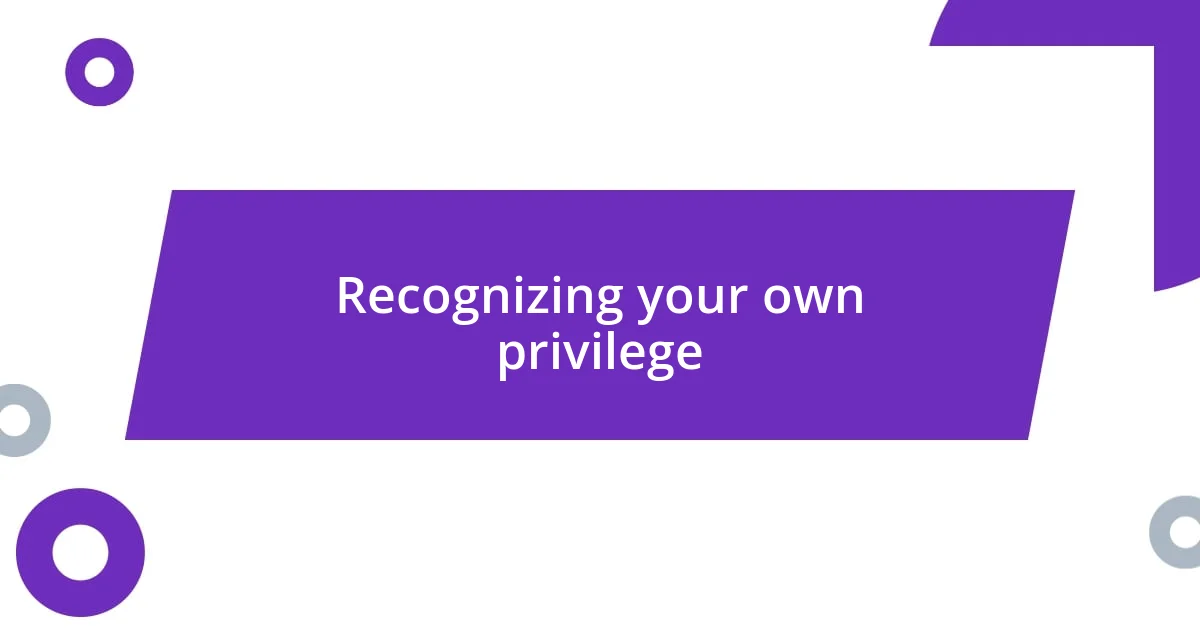
Recognizing your own privilege
Recognizing our own privilege can be a challenging but essential part of becoming a better ally. For me, the realization came during a conversation with a friend who shared her experiences as a woman of color in a predominantly white workplace. I remember feeling a mix of discomfort and understanding when she highlighted how she had to navigate systemic barriers while I had the safety of invisibility in similar spaces. It made me wonder—how often do I take for granted the opportunities afforded to me simply because of who I am?
Privilege isn’t a badge of honor; instead, it’s a responsibility that comes with awareness. I recall a moment during a volunteer event when I was confronted by a young activist about my tendency to speak over others. Her words stung, but I knew they were true. That moment felt like a wake-up call, reminding me to step back and listen more. It’s essential to recognize that privilege can silence others, and being an ally means ensuring their voices are heard.
When I look around and see disparities in representation, it reinforces the importance of self-reflection and recognition. My journey to acknowledging my privilege involves ongoing learning and growth. Just the other day, I caught myself hesitating to include diverse perspectives in a project, and I paused to rethink my approach. It’s those everyday moments where I can truly evaluate how my privilege plays a role not just in my life, but in the opportunities I create—or deny—for others.
| Example of Privilege | Impact on Allyship |
|---|---|
| Access to Quality Education | Leads to better job opportunities and awareness of systemic issues. |
| Safe Living Environment | Gives peace of mind and allows for focus on personal growth and advocacy. |
| Unquestioned Identity | Means less fear in expressing thoughts; can overshadow marginalized voices. |
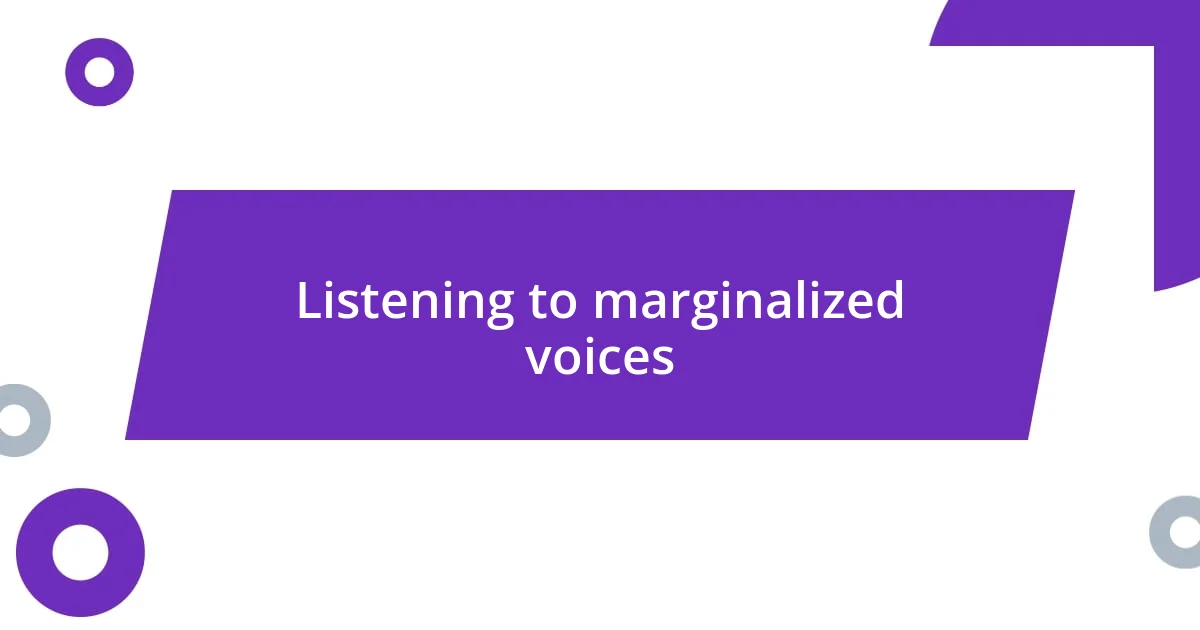
Listening to marginalized voices
Listening to marginalized voices is a transformative experience that reshapes my understanding of the world. I vividly remember participating in a panel discussion where individuals from different backgrounds shared their stories. Each account felt like a journey through someone else’s eyes, exposing challenges I had never considered. In those moments, I understood that true allyship requires more than just hearing words; it demands immersion in the narratives of those we wish to support.
- Create safe spaces for open dialogue. This allows people to share their experiences without fear of judgment.
- Prioritize active listening by giving your full attention, maintaining eye contact, and refraining from interrupting.
- Seek out and uplift underrepresented voices in conversations, allowing them to lead discussions on their own experiences.
- Reflect on your privilege and how it might impact the narratives you encounter. Recognize that your perspective is only one piece of a much larger puzzle.
- Practice empathy by putting yourself in the shoes of those sharing their stories, which can foster deeper understanding and connection.
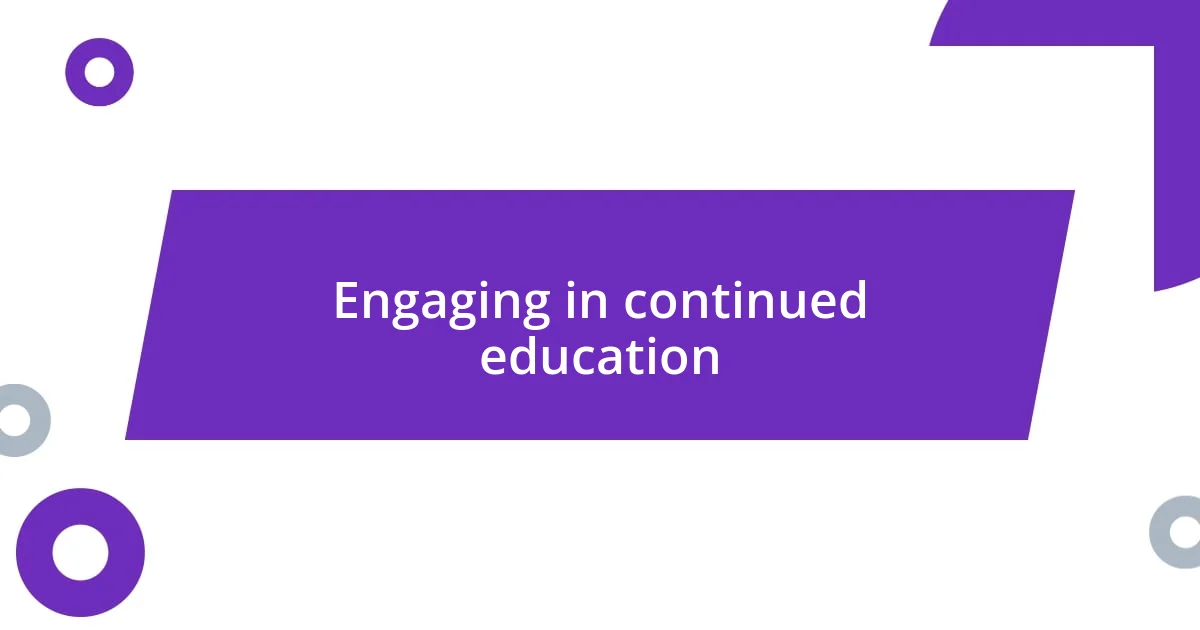
Engaging in continued education
Engaging in continued education is a critical piece in my journey towards becoming a better ally. I remember attending a workshop focused on intersectionality, which opened my eyes to the complexity of people’s experiences. It made me realize that my understanding of diversity needed to be more nuanced, prompting me to seek resources and training that dive deeper into issues like race, gender, and socio-economic status.
As I explore various educational avenues, I find that podcasts and books often challenge my preconceived notions. For instance, one author described a moment of privilege that completely shifted my perspective—it resonated so deeply that I had to pause and reflect on my own life. This kind of introspection is essential; it pushes me to confront biases I may not even be aware of. I often ask myself: How can I assist if I don’t fully grasp the landscape someone else is navigating?
Engaging in continued education isn’t just about acquiring knowledge; it’s about actively applying what I learn. After attending a seminar on allyship, I felt compelled to change how I interact with my community. I started facilitating discussions at my workplace, allowing others to share their experiences without interruption. Those moments reinforced my belief that education is a continuous journey, and it’s my responsibility to ensure that I’m learning and growing every step of the way.
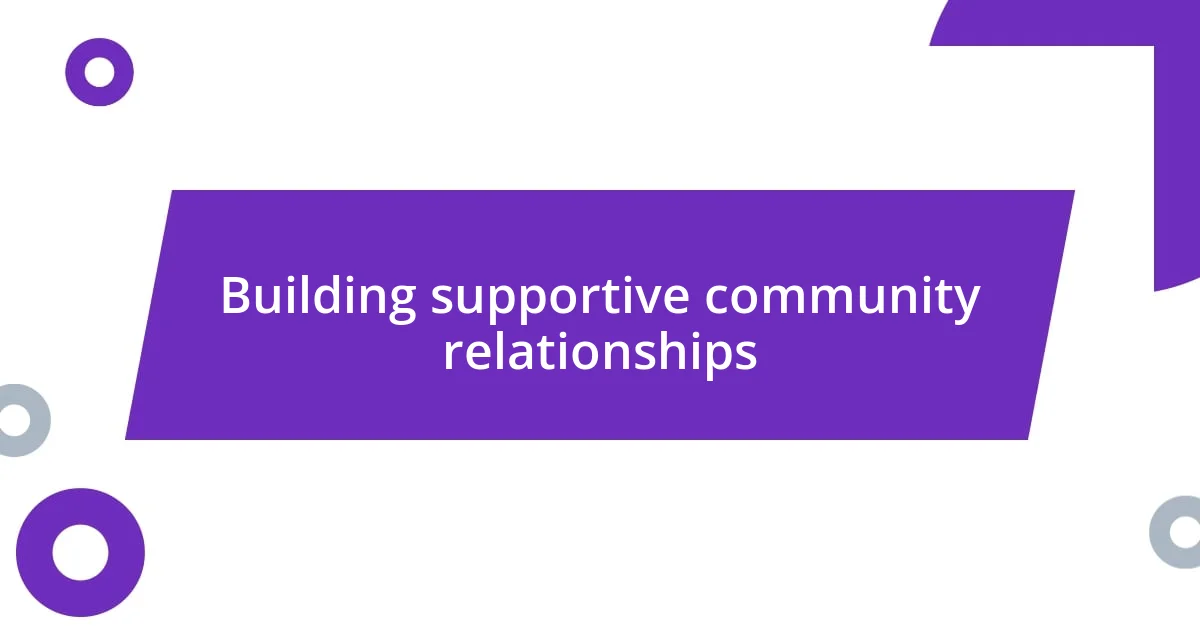
Building supportive community relationships
Building supportive community relationships requires deliberate effort and authenticity. I recall a volunteering experience at a local shelter where I was surprised by how quickly bonds formed among volunteers and clients alike. We weren’t just serving food; we were sharing struggles and laughter, recognizing the humanity in each other. It taught me that true support comes from a place of connection, where individuals feel valued and recognized. How often do we take the time to really engage with our communities?
When I began to focus on building these relationships, I found that small gestures made a significant impact. For example, hosting a simple potluck event allowed people to share not just their cultures, but their stories, too. I was reminded of the power of food in bringing people together. As dishes were passed around, conversations flowed effortlessly, revealing the dreams and challenges we all shared. It was a beautiful reminder that sometimes, the best way to foster community is by creating a space for shared experiences.
I also learned the importance of collaboration and collective action. A few months ago, I joined a local group aimed at advocating for social justice. I felt a sense of belonging as we worked together on initiatives. Each meeting reinforced my belief that change is often a community effort. While I might have my own insights, what I found profound was the wealth of diverse perspectives that emerged from our discussions. It’s a reminder that building supportive relationships means valuing and elevating every voice—especially those that are often left unheard.
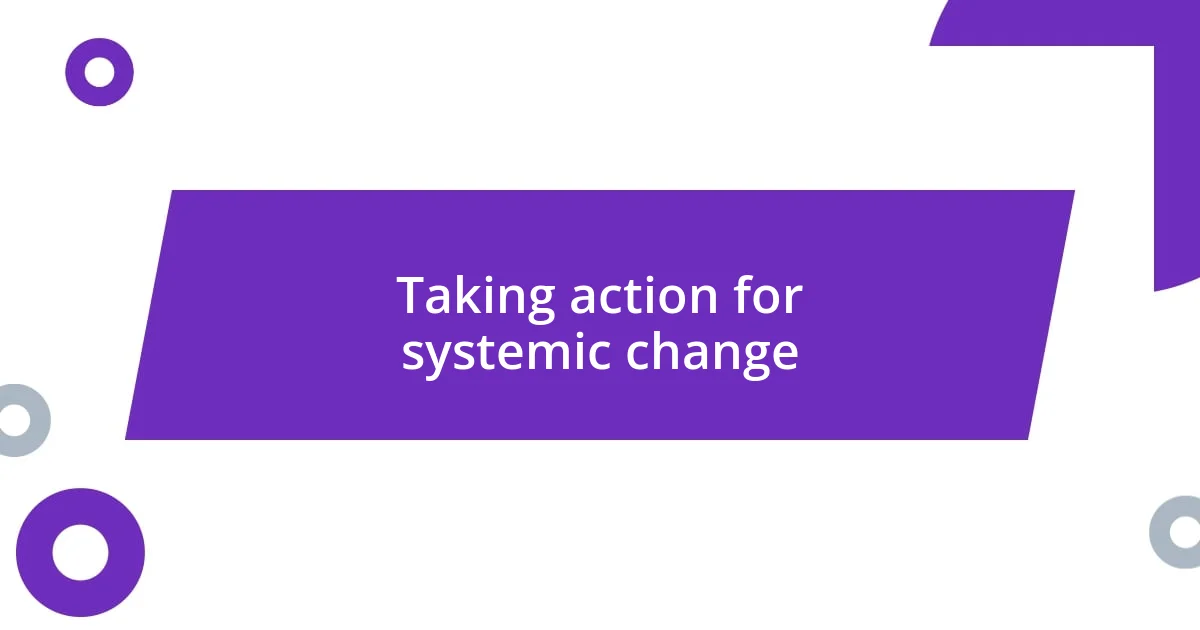
Taking action for systemic change
Taking action for systemic change often feels like a daunting task, but my journey has shown me that every small effort contributes to a larger impact. One time, I participated in a local advocacy campaign aimed at reforming education funding. Together with a group of passionate allies, we organized community forums where we listened to students and parents share their experiences. Their stories were eye-opening for me, revealing the urgent need for change. Isn’t it fascinating how the stories we hear can ignite our passion for action?
I’ve also learned that communicating these experiences effectively is crucial for systemic change. During those forums, we developed a strategy to share our findings with local policymakers. I remember drafting a heartfelt letter to our city council that stressed the importance of equitable resources in schools. It felt incredibly empowering to know that our collective voice could drive policy. I often wonder: If we don’t raise our voices, who will?
Moreover, leveraging social media has been a game-changer in my advocacy efforts. After joining campaigns online, I started amplifying marginalized voices through my own platforms. I remember sharing a powerful post from a young activist that inspired me. This simple act not only spread awareness but also connected me with others who shared my mission. It reinforced my belief that every action we take—whether in person or online—can ripple out, creating a wave of systemic change. How can we not harness these tools for good when they have the potential to transform minds and hearts?
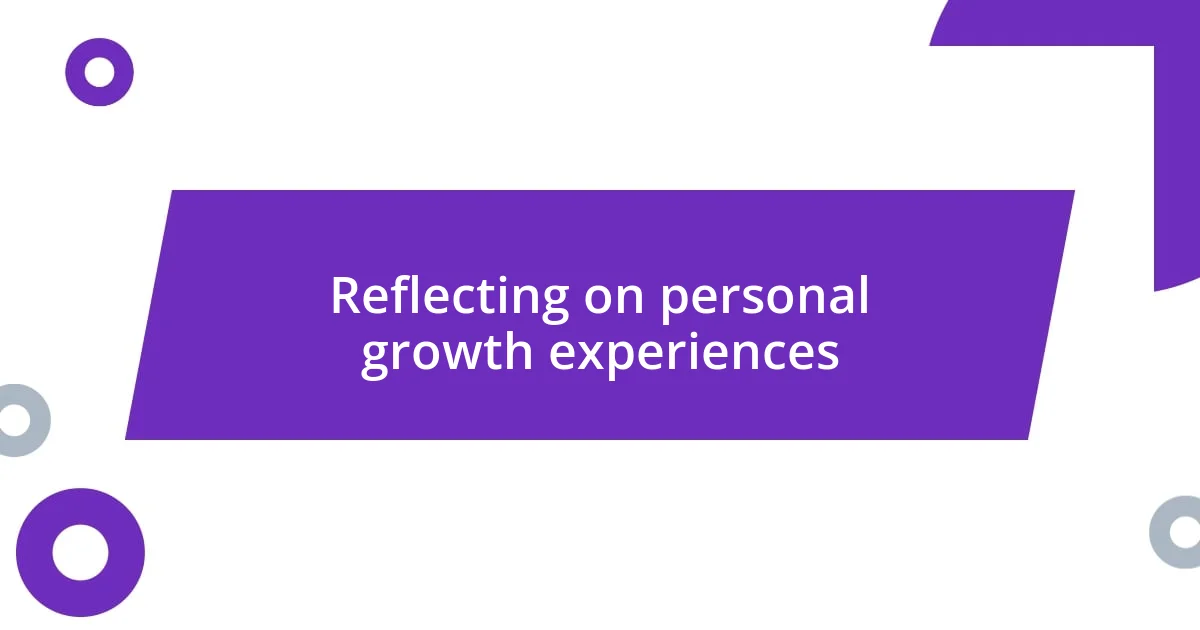
Reflecting on personal growth experiences
Reflecting on my personal growth experiences feels like reading an old journal. I remember my first workshop on allyship; the discomfort of confronting my own biases was overwhelming. It was a safe space, but I felt exposed, grappling with emotions I hadn’t acknowledged before. Isn’t it strange how vulnerability can lead to profound learning? In that space, I began to understand the importance of humility and a willingness to learn from others’ truths.
As I continued to engage in reflective practices, journaling became my daily companion. Each entry helped me untangle my thoughts and emotions about privilege and injustice. I would ask myself, “What does it mean to truly listen?” This question pushed me to be more attentive in conversations, ensuring that I didn’t just speak to fill silence but actively sought to understand and validate others’ experiences. The beauty of this journey lies in realizing that growth isn’t linear; sometimes, it involves revisiting past mistakes and embracing the lessons they offer.
Most recently, I participated in a retreat focused on racial equity, where deep discussions and shared experiences transformed my understanding of allyship. I vividly recall a moment when a participant shared their painful story of discrimination, and I felt a wave of empathy wash over me. It reminded me that my journey is not only about advocacy but also about connection and compassion. Have you ever felt that pull to do more after someone shares their story with you? It’s a reminder that our personal growth is intricately tied to the stories we hear and the relationships we build along the way.


